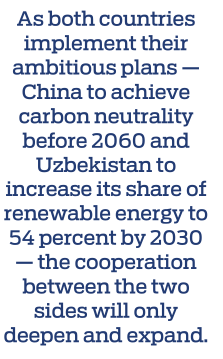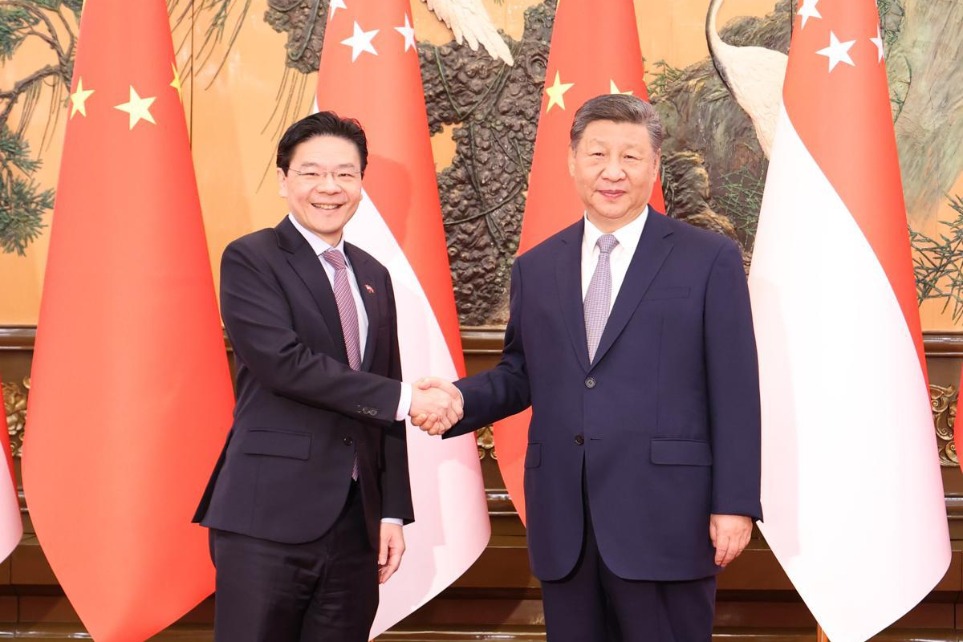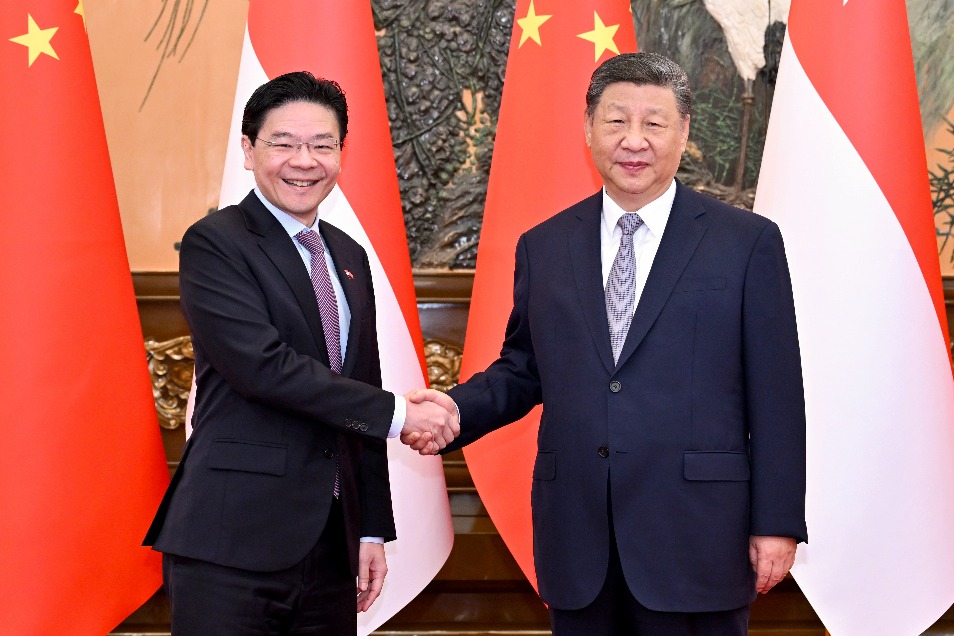Foundation for long-term partnership
In the pursuit of green goals, Uzbekistan and China can create joint research centers, exchange specialists and develop green financing and digital monitoring technologies


In recent years, relations between Uzbekistan and China have seen a remarkable transformation, turning bilateral interaction into the epitome of successful interstate cooperation. Thanks to the active efforts of the leaders of the two countries, these relations have reached a new, higher level with the establishment of an all-weather comprehensive strategic partnership.
The significant momentum in the interaction between Uzbekistan and China includes the green energy sector, which implies cooperation in the use of technologies that promote environmental efficiency and sustainability.
In recent years, China has secured its status as an undisputed leader in the field of renewable energy and green technologies. Green development policy has become one of the priority tasks of the Chinese government, the main goal of which is to achieve carbon neutrality before 2060. China's achievements in renewable energy are astonishing in their scale. In the last decade, wind power generation has increased sixfold, and solar power generation more than 180-fold. These figures clearly demonstrate the pace of energy transformation that until recently seemed unachievable.
Meanwhile, Uzbekistan has, in recent years, become one of the drivers consolidating regional cooperation in combating climate change, as well as promoting the transformation of Central Asia into one of the centers for the development of a green economy and clean energy. Speaking at the summit of the Abu Dhabi Sustainability Week in January, Uzbekistan's President Shavkat Mirziyoyev said: "The strategic goal of the New Uzbekistan is to ensure environmental stability and transition to a resource-efficient green economic development model."
The integration of the two countries' potentials in the field of green development has led to the implementation of large-scale joint projects that will not only transform the energy landscape of Uzbekistan, but also create a new model of international cooperation in the field of sustainable development.
The implementation of joint projects for the widespread introduction of renewable energy sources is a relevant area of Uzbek-Chinese cooperation. Strengthening this interaction undoubtedly contributes to increasing energy security and environmental stability in Uzbekistan, as well as a more effective implementation of the program for the transition to a green economy by 2030.
The historic agreements reached between Uzbekistan and China in Xi'an in May 2023 marked a turning point in bilateral cooperation. An agreement was signed to build 11 solar and wind power plants worth $4.4 billion. These agreements laid the foundation for the energy transformation of the entire region.
In record time, construction work was completed on two large-scale projects in the Kashkadarya and Bukhara regions. The Chinese company, China Gezhouba Group Co, completed the first phase of the solar power plants, each worth $350 million. Particular attention is also being paid to scientific and environmental cooperation. In May, a historic memorandum of understanding was signed between Ministry of Ecology, Environmental Protection and Climate Change of Uzbekistan and the Xinjiang Institute of Ecology and Geography of the Chinese Academy of Sciences to establish the Central Asian Research Center for Ecology and Environment located at the Green University in Tashkent. The new center will become a platform for joint scientific research, training of qualified specialists, exchange of modern technologies and the promotion of the principles of green and sustainable development throughout Central Asia.
At the same time, the development of cooperation in the production of new-generation cars — electric and hybrid — is of particular importance in Uzbek-Chinese cooperation. This area not only corresponds to the global agenda of sustainable development, but also opens up access to advanced technologies and large-scale investments for Uzbekistan.
In 2023, key agreements were signed with Chinese auto brands EXEED and BYD, which laid the foundation for a modern industrial base in the field of green auto industry in Uzbekistan. Official sales of BYD cars in Uzbekistan began in March 2023, and today there are 16 official dealerships and service centers offering advanced service options.
The culmination was the launch of a new BYD electric vehicle assembly plant in the Jizzakh region on June 27, 2024. The project, built at a total cost of $160 million, can churn out 50,000 cars a year. Over the year, it has attracted $60 million in foreign direct investment and created 1,300 jobs. The plant is equipped with advanced equipment, including the only high-tech laboratory in the Commonwealth of Independent States.
Local production of components is also increasing. About 60 items are already produced at seven facilities in the country. Eight BYD models adapted to the country's climatic conditions are available in the domestic market. The process of accelerated localization opens up new prospects for the development of engineering and production competencies.
Plans for the creation of infrastructure are of strategic importance. According to the signed agreements, 70 centralized and 50,000 decentralized electric charging stations will be built in Uzbekistan by 2033, which will be an important step toward building a sustainable transport system of the future. Cooperation with BYD also includes the training of local personnel. Together with the Jizzakh Polytechnic Institute and the Turin Polytechnic University in Tashkent, it is planned to create an engineering training center for highly qualified specialists.
Thus, the strategic partnership between Uzbekistan and China in the field of green development represents a unique model of international cooperation, which demonstrates how countries with different economic systems and levels of development can effectively join forces to address global environmental challenges. China brings advanced technologies, financial resources and rich experience in large-scale implementation of renewable energy sources to the partnership, while Uzbekistan provides favorable natural and climatic conditions, a dynamically developing economy and a strategically important geographic location.
As both countries implement their ambitious plans — China to achieve carbon neutrality before 2060 and Uzbekistan to increase its share of renewable energy to 54 percent by 2030 — the cooperation between the two sides will only deepen and expand. The creation of joint research centers, the exchange of students and specialists, and the development of green financing and digital monitoring technologies lay a solid foundation for a long-term partnership.


The author is a leading research fellow at the Institute for Strategic and Regional Studies under the President of the Republic of Uzbekistan. The author contributed this article to China Watch, a think tank powered by China Daily.
Contact the editor at editor@chinawatch.cn.
































